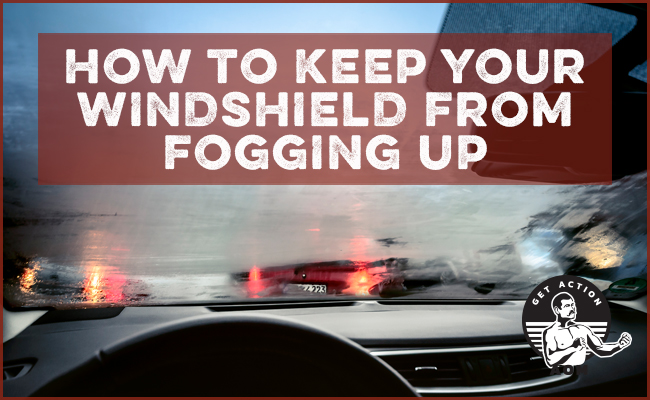
You’re driving down the highway and your car’s windshield fogs up, so you blast the defroster. The fog goes away but then returns again a few minutes later. You repeat this process until you arrive at your destination.
The same thing happens to the car’s driver- and passenger-side windows. The windows fog up so you can’t see your rearview mirrors, so you roll the windows down and then back up to squeegee the moisture off. But then the fog simply comes back again.
And on the fight against vehicular window fog, and its visibility-robbing haze, goes.
Fortunately, there’s a way to escape this seemingly endless cycle of fog recurrence and achieve driving nirvana. We share your exit strategy below.
Why Does Your Windshield Fog Up?
To understand how to prevent your vehicle’s windshield (and windows) from fogging up, it helps to understand why they fog up in the first place.
Fog on the inside or outside of your car windshield is condensation that forms due to a difference in temperature and humidity near the glass. The nature of this differential varies according to the season of the year.
During the winter, window fog typically occurs inside of your car. That’s because the temperature and humidity on the inside of your vehicle are higher than they are outside of it. All that hot vapor from the passengers’ breath condenses on the inside of the windows/windshield once it hits the cool glass.
When you experience foggy car windows in the summer, the condensation usually occurs on the outside of the car windows. That’s because the temperature and humidity on the outside of your car are higher than on the inside where you’ve got the cold, dry A/C running. Once the hot, moist summer air hits your car’s windows, condensation forms on the outside of the glass.
Knowing where the condensation is forming — inside or outside — will guide how you implement your preventive anti-fog measures.
How to Keep Your Windshield From Fogging Up
Clean your windows. The first step in preventing automotive fog is to give your vehicle’s windows and windshield a nice wipe down. Dirt and oils on the glass will attract and maintain condensation. Clean your car’s windows/windshield on both sides with some window cleaner and a newspaper or paper towel.
Apply an anti-fog spray. Anti-fog spray contains chemicals that prevent water from condensing on your glass.
Remember, if it’s winter, the fog will be forming on the inside of your windows/windshield, so make sure to get a spray that’s designed for interior glass.
If it’s summer, you’ll want to apply the anti-fog spray on the outside of the glass and you’ll want to use a product designed for the exterior.
Thoroughly cleaning your windows before applying anti-fog spray is a big key in their efficacy, so don’t neglect the step one recommendation above.
Use home anti-fog remedies. If you don’t want to go to the auto supply store or have a bottle of commercial anti-fog spray Amazon Primed to you, there are some home remedies you can use to prevent fog from forming on your glass:
- Shaving cream. I’m talking about the old-school Barbasol variety. Spray some on a towel and wipe on your glass. Wipe the glass clean with a clean towel.
- A potato. Strangely enough, the starch and sugars in a potato can act as a fog repellent. Simply cut a potato in half and rub the exposed half on your windows/windshield. Wipe off any excess potato juice, lest you leave a white coat of starch on your glass.
Turn off the recirculate button on your air-conditioner/heater. You’ve likely seen this button on your car’s console but may never have really understood what it did. When the recirculate button is engaged, your vehicle uses air from inside your vehicle for heating and cooling; it continually recirculates the same air, allowing it to be heated/cooled more effectively. When the button is off, the car heats and cools using air brought in from the outside.
If condensation forms on the inside of your car during the winter, you can probably see why it would be a bad idea to recirculate this warm, moist interior air. It just perpetuates the fuel that feeds windshield fog.
So make sure the recirculate button is off.
Turn the heat and A/C on at the same time. When it’s cold outside, you want the heat on in your car so that you’re warm. But warm air causes condensation to form on your windshield. So how can you stay warm without fogging up the glass?
Turn the A/C on at the same time as you crank up the heat in your car.
Running the hot air through the A/C compressor will dry out the air. By reducing the moisture in the warm air blowing in your car, you reduce the likelihood of your windshield and windows fogging up.
Just make sure your car’s A/C button is on when you crank the heat up. That’s all there is to it. And no, this won’t damage your car’s air-conditioning.
When all else fails, blast the defroster to the max. If you’ve done all these things, and you still get some fog, you can always turn the defroster up to full blast. The warm, dry air will evaporate the moisture on the interior of your windshield, defogging your glass immediately. This is a temporary fix, though. If the humidity is still high inside your car, you’ll just get a foggy windshield again. Make sure the recirculate button is off, and try re-cleaning your windows/re-applying anti-fog spray when you return home.
The post How to Keep Your Windshield From Fogging Up appeared first on The Art of Manliness.
0 Commentaires